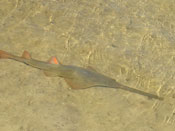CITES: International ban on trade of Critically Endangered sawfish adopted

The Hague 11.07.06: Today, Parties to the Convention on International Trade in Endangered Species (CITES) adopted a landmark proposal to ban international trade in sawfish, shark-like rays with elongated, tooth-studded snouts considered Critically Endangered around the world.
The proposal was made jointly by the United States and Kenya, and was weakened slightly by an annotation from Australia to allow limited trade in live specimens from one Australia species for conservation purposes. The amended proposal received at least 69% of the vote; 66.67% is needed for adoption. The US first proposed a ban on sawfish trade at CITES ten years ago.
“We applaud the Parties to CITES for taking this key step for global sawfish protection,” said Sonja Fordham, Policy Director for the Shark Alliance, who serves on the US Sawfish Recovery Team and spoke in favor of the proposal. “These exceptional rays are among the most endangered fish in the world and urgently need protection from a variety of threats including trade in the valuable fins and saws. We thank the US and Kenya for their leadership and the European Union for their strong support of this landmark action.”
Parties speaking out in support of sawfish listing in today’s debate included the European Union, Mexico, India, Ecuador, Nicaragua, New Zealand, Brunei, Thailand, and Norway. China and Qatar spoke out in opposition of the listing. In a dramatic twist, Indonesia, the world’s top shark fishing nation, spoke initially in favor, but changed its position by the end of the debate after getting late word for home. Today’s decision must still be adopted in the CITES Plenary session later this week.






